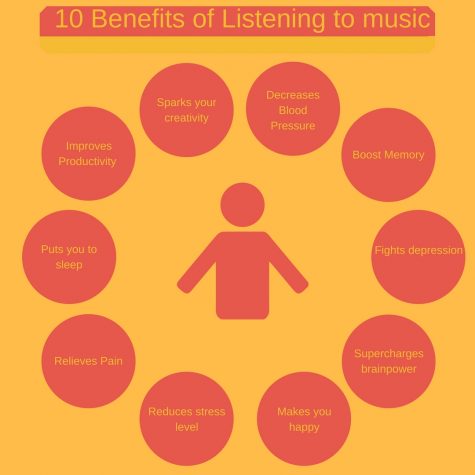Benefits of listening to your favorite tunes
November 17, 2017
Soothing, empowering, spiritual, romantic, inspiring. These are all words that can be used to describe how music can affect a person’s emotions. Whether you’re getting over a relationship, driving your car, or simply studying, music can help you through it all. Music holds a unique link to our emotions. This link gives music the ability to improve our moods, boost our energy, relieve our pain and also reduce our stress.
Music of all kinds, especially quiet classical music, have beneficial relaxing qualities. One study that took place at a local hospital found that when they played music throughout the building, their patient’s stress and anxiety levels dropped at a staggering rate. Music has this effect because of its ability to slow down heart rate and lower blood pressure, which then decreases the total level of stress hormones throughout a person’s body.
“I can always count on music to relax me when I’m worrying or am stressed out about something,” said junior Emily Hayes. “During Ambassador hell week, when we have to be at the school practicing for our show all the time, listening to music definitely helps me from getting worked up about my homework or other things going on in my life.”
 Music activates both the left and right sides of the brain simultaneously. The activation of both hemispheres can maximize learning and improve memory. This is why working with music can be a great advantage.
Music activates both the left and right sides of the brain simultaneously. The activation of both hemispheres can maximize learning and improve memory. This is why working with music can be a great advantage.
“When I’m studying, I try to listen to music that amps me up and gives me the motivation to get my work done,” said Hayes. “Other than that, I like to listen to Michael Buble a lot when I’m just chilling or driving around the town.”
In the past few years, scientists have made major discoveries on how music can help people during their daily lives. They have found that listening to music you enjoy while attempting to do work may confuse your focus. Music you enjoy releases dopamine to the brain which prevents listeners from fulfilling their true potential. Instead, scientists encourage you to listen to music you wouldn’t normally listen to, as this allows the brain to stimulate and focus on the work in front of you. Scientists have also suggested that you listen to songs with a heavy bass in the morning in order to start a productive day. Hard rock and hip-hop produce a surge of confidence and inspire feelings of power that can help you gather the energy you need for the remainder of the day. Music also has the ability to guide you through rough days. Studies have shown that sad music gives the listener the ability to guide themselves through their negative emotions. Psychologically, sad music helps a person face their feelings rather than ignore them.
“Music becomes my getaway from everything,” said sophomore Sheehan Personett. “You can put on music, sit down, and relax. Normally my brain goes 100,000 miles per hour, but when I want to chill out, I can put on some songs and relax. It’s very therapeutic.”
Whether you’re playing, listening, or making music, remember that it provides constant aid to the stability of our emotions and actions. Never underestimate the therapeutic power that comes with music. The next time you find yourself with mounds of homework, or in need of quick and lasting energy in the morning, the simple solution is to pop in your earbuds and let the music play.









